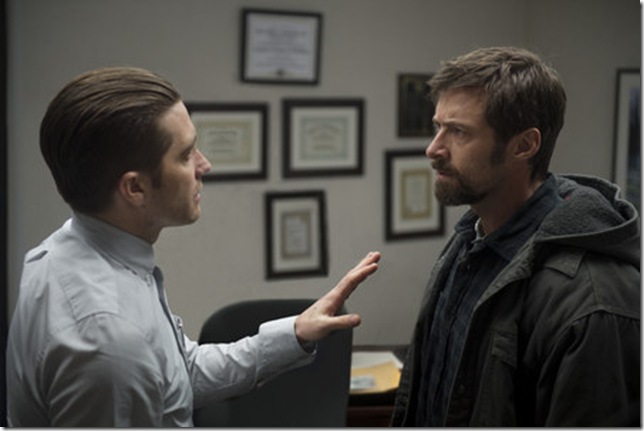Prisoners opens like an episode of Law & Order: SVU and concludes, some two and half hours later, like a gothic horror film that would have won the approval of Edgar Allan Poe. Somewhere along the way, as the audience ascends film’s spiral staircase of twists and turns, with its many false leads, red herrings, blown fuses and unanswered questions, it nearly achieves the mythos of a Great American Tragedy. And it took a French-Canadian to arrive there.
The film is directed by Denis Villeneuve, the vision behind the Oscar-nominated Incendies, a similar puzzle box in which an evil past collides unwittingly with a vulnerable present. For his English-language debut, he borrows familiar tools from the canon of small- and large-screen police procedurals, focusing on a roguish police investigator (Jake Gyllenhaal, in obsessive Zodiac mode), working under a requisite hard-nosed, callous captain (Wayne Duvall), to find two girls who have gone missing from their suburban families on Thanksgiving. We’re told the relentless detective, referred to only Loki, has “solved every case he’s ever been assigned,” a cliché of indestructibility the movie is all too happy to exploit.
Don’t worry; it gets a lot better. It isn’t long before Loki and his team track down their suspect, a slow-witted, asymmetrical fellow named Alex Jones (Paul Dano), who had camped his pervy-looking RV in the neighborhood the day of the abduction. But they find no proof or evidence to support Alex’s arrest, and it seems the police are continuing to search a blind alley. As a result, Keller Dover (Hugh Jackman), the father of one of the missing girls, begins to act more and more unhinged as the days pass.
Jackman’s performance is anxious, volcanic and deeply unsettling; it’s some of the best work he’s ever done. By contrast, his splashy musicals and superhero diversions look like the work of a great thespian slumming to pay for the house. He is at once the movie’s tortured soul and its rapidly increasing soullessness, the 180-degree plunge of Walter White escalated into a single feature-length chunk.
The actions Keller takes, which are brutally disturbing and difficult to watch, elevate Prisoners beyond the familiar, and once it goes there, it never turns back. This is a film, in part, about the motivating factors that can drive an innocent man — a “good Christian man,” in Keller’s case, who references Bible verses in times of stress — to become an inhuman monster. Because he seems like the average American father, his journey into the abyss is a stunningly brave choice, far darker and more fraught with inconvenient truths than Liam Neeson’s one-note, morally correct quest for his missing daughter in Taken.
The plural ‘s’ at the end of Prisoners, therefore, becomes like the plurality of the properly translated Bicycle Thieves, Vittorio De Sica’s neorealist classic: We’re all trapped and implicated — there isn’t anything of which we’re not capable.
If narrative pills like these are a bit hard to swallow, you can always accept Prisoners as a face-value, escapist thriller, but even then, don’t expect to sit back in your seat and relax. This is a bare-knuckled, pins-and-needles saga whose plot developments expand a kidnapping crime into a vast, many-tentacled psychological excavation.
After being one step ahead of filmmakers for one too many middlebrow thrillers, it’s nice to finally witness a movie that completely catches me off guard. If we have to watch a superhero cop unrealistically break down a few doors with a raised foot every now and then, so be it.
PRISONERS. Director: Denis Villeneuve; Cast: Jake Gyllenhaal, Hugh Jackman, Paul Dano, Maria Bello, Melissa Leo, Viola Davis, Terrence Howard, Dylan Minnette, Wayne Duvall, Len Cariou; Distributor: Warner Brothers; Rated R; Now playing in theaters everywhere.
